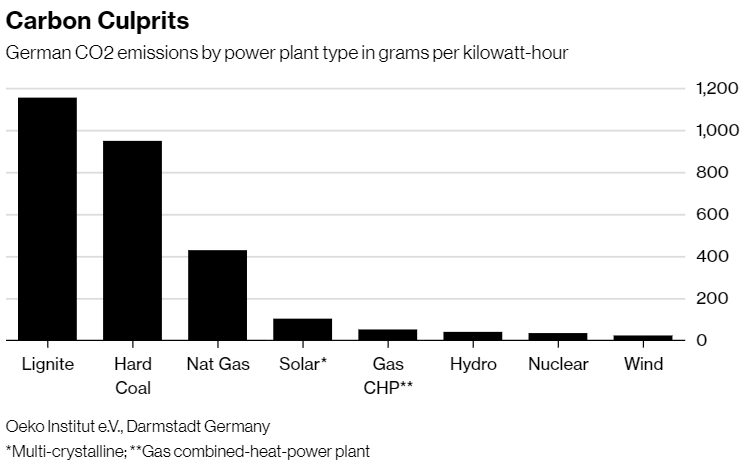German Electric Utility Company RWE Fears Lignite Industry Collapse in Hasty Coal Exit by Merkel

By Brian Parkin and William Wilkes
September 12, 2018 - German Chancellor Angela Merkel’s plan to phase out coal-fired power plants in Germany should stop short of “prematurely” closing brown coal facilities, or she risks the collapse of the nation’s mining industry as well as persistent blackouts, RWE AG said in a report.
Shuttering coal plants may have a “domino” effect on mining, which is regulated by concessions that would take years to renegotiate, Germany’s biggest power producer said in a report sent to the coal commission at the end of August and obtained by Bloomberg News. Without new permits, mining would cease and bring “the whole system to a standstill.” The body is due to present an exit road map next month.
Germany has set up a commission to plot its phase-out from coal power as it struggles to meet the obligations under the 2015 Paris Agreement and is set to miss its 2020 target to reduce pollution. The commission’s work has taken on broader resonance in Germany after scientists linked this summer’s forest fires in California, drought in Europe and stronger Atlantic hurricanes to climate change.
RWE was asked by the coal commission to present its view, a spokeswoman said, declining to comment further.

Rival utility Uniper SE in July proposed closing some of its oldest coal plants to help Germany narrow a gap in reducing its carbon dioxide emissions. The company said it would expect payment for placing plants that are over 40 years old into a strategic reserve.
Germany’s main lignite miners and burners RWE and Lausitz Energie Kraftwerke AG have grounds for concern. The industry employs thousands of people and villages and small towns are built around the giant sites that’s mined the mineral for decades.
LEAG has champions in the coal comission, including two co-chairmen who are the former governors of lignite-mining states Saxony and Brandenburg. Federal and state officials have expressed fear that shutting lignite plants in the regions may cripple the local economy and foment political troubles.
RWE’s lignite assets are also substantial. They include three open-cast mines in North-Rhine Westphalia which together churn out 90 million tons of coal annually, or more than half of the nation’s demand. Two pits, Garzweiler and Hambach, have permits running to mid-century.
The fuel powers six RWE plants with a total capacity of about 10 gigawatts, or just under a quarter of the company’s power generation capacity in Europe. RWE’s lignite operations support 10,000 jobs in the region -- and helps keep the lights on. Lignite had a 25 percent in share in German power generation last year. As much as half was supplied by RWE.

Pressure to reduce Germany emissions places RWE’s lignite plants in the firing line at a juncture when its transfer of Innogy SE to EON SE will leverage the role of its conventional power plants in its business.
Innogy contributed the lion’s share, or 2.8 billion euros ($3.24 billion), of RWE’s adjusted profit last year of 3.64 billion euros. Lignite and nuclear assets were just 10 percent of that.
Germany will inevitably seek to retire some coal plants as it tries to narrow a gap in meeting its 2020 target, Environment Minister Svenja Schulze said in July. She wasn’t more specific. Power plants burning coal churned out about a third of all carbon emissions in Germany last year, according to Schulze’s ministry.
RWE’s claims of a domino effect of lignite plant closures on mining are “spurious,” Oliver Krischerm, an opposition lawmaker for the Green Party and part of the coal commission, said by email. A utility that can’t adjust its power capacity to Germany’s energy shift is “doomed,” he said.

